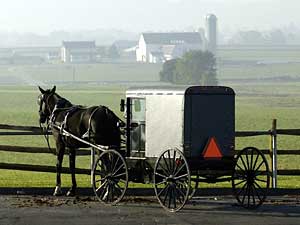|
Audio
Photos
More from MPR
Resources
|
Collegeville, Minn. — The Amish child first diagnosed with polio is still hospitalized. The baby is being treated, not for polio, but for an immune deficiency. The other four children with the infection, all under the age of 16, are otherwise healthy.
So far none of the children have shown any symptoms. Health officials say only one in 200 people with the virus develop paralysis.
State epidemiologist Dr. Harry Hull says the high profile polio cases have actually helped their effort to get Amish communities statewide immunized. According to Hull, the cases serve as a warning for any group that doesn't believe in immunization.
"These diseases are gone from this country because we have such high rates of immunization. But they do come in and if you're not immunized, you're not fully protected," Hull said.
Despite warnings from health experts, some people still avoid immunizations. For the Amish, it's for religious or social reasons. Typically the Amish avoid preventive health care, including vaccinations.
Outside of the Amish community, there are others who are concerned about potential side effects from vaccines. Some don't think they're needed at all.
One example is Christina Abel of Crystal, Minnesota. She has nine grown children, the youngest is 18. As a young mother and a nurse, Abel didn't immunize any of her children. They're all healthy, so she doesn't regret her decision.
"No, I don't think so. Because they're healthy. Vaccinating them, would that have made them healthier?" Abel asked.
Choosing to not vaccinate her children was a medical decision for Abel. She says she thinks the diseases children face, whether they're mumps, measles, chicken pox or even polio, weren't a great threat to her kids.
|
There's no reason why every child in America shouldn't be vaccinated against polio.
- Dr. Richard Bruno, polio expert
|
Abel says she's not anti-immunization, but wishes more parents would ask their doctor questions on the safety of vaccinations, and the risk of disease, before their children get shots.
"Some people don't even want to deal with that. They feel they have to have a child vaccinated to get into school, so they pay a doctor to make those decisions for them," Abel said.
But some parents don't and the law doesn't require it, nor do Minnesota schools. Many states require children be vaccinated before entering school. Minnesota requires either a vaccination, or a signed statement from the parent explaining why they're opposed to vaccination.
Despite that, 98 percent of school-age children in Minnesota have had all their shots. Nationally the rate is 95 percent.
For some health experts, like Dr. Richard Bruno, that number is not high enough.
"There's no reason why every child in America shouldn't be vaccinated against polio," said Bruno. "Parents should demand it, and school districts should demand that every kid that comes into kindergarten be vaccinated against polio and all diseases."
Bruno is chairman of the New Jersey-based International Post-Polio Task Force. He says even a small number of unvaccinated children represents a potential problem. Imagine if polio were to pop up in New York City, where 23,000 kids under 2 years old are unvaccinated.
"We start getting not just five cases as in Minnesota, but 50 or 500 cases of polio. Parents are going to wake up and say, 'We should be vaccinating.' The price of not vaccinating is much higher than the potential price of vaccinating," Bruno said.
The polio vaccine has been made from a dead virus since 2000, so Bruno said there's no risk of developing polio from the new vaccine.
The Minnesota cases of polio are suspected to have come from a live virus vaccination, possibly from a foreign country. But that could have been a virus that spread through several people, for many years, before it made its way to Minnesota.
State health officials say they expect a long and difficult investigation into the source of the polio virus in Minnesota. They're not sure they'll ever have any solid answers.





